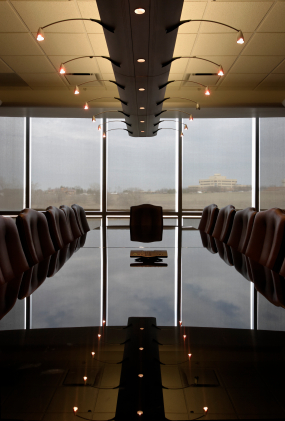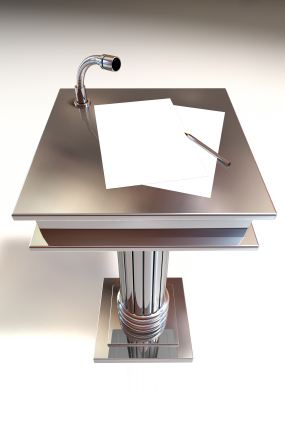FEATURE ARTICLE -
From the President, Issue 17: May 2007
I’m sure that all members join me in welcoming Her Excellency to this august position within the Association.
Pending Legislation
Two Bills of particular significance to us were introduced to the House during the latest sittings of State Parliament:
Legal Profession Bill 2007
 This Bill, when passed, will be the next step in Queensland’s adoption of the National Model Laws for the Legal Profession. Many of the provisions introduced by this Bill deal with matters of more concern to solicitors, such as trust account regulation.
This Bill, when passed, will be the next step in Queensland’s adoption of the National Model Laws for the Legal Profession. Many of the provisions introduced by this Bill deal with matters of more concern to solicitors, such as trust account regulation.
But some of the provisions will affect our practices as barristers. In particular:
- It is likely that the Bill, when passed, will effectively require us to have costs agreements with our instructing solicitors. It will do so by providing that, in the absence of a costs agreement, our right to recover fees will be limited to scale fees or assessed fees. Concomitant with the requirement for costs agreements will be the right to sue solicitors for our fees. These provisions are, of course, a radical departure from the traditional relationship between counsel and instructing solicitors. Consistent with the sentiment expressed at a general meeting of the Bar Association that many of our members would prefer to retain the traditional “honorarium” arrangement, we have lobbied hard to carve out the traditional arrangements from the new provisions, and we will continue to do so. Members should be aware, however, that the new provisions are part of the Model Laws which have been proposed for the profession nationally. Our colleagues at the New South Wales Bar have been operating under the new scheme for some time now.
- We will be subject to a limited costs disclosure regime — the Act will specify the information we have to provide to our solicitors about our fees to enable the solicitors to make full disclosure to the clients.
Those barristers who accept direct-access briefs will need to study the Act in some detail, as there are particular provisions which will regulate the way in which they must deal with clients.
I expect that we will have a lengthy transition period to enable us to get used to the new provisions. The Association will, of course, run CPD events and provide as much assistance as possible to assist members with the new processes.
To download a copy of the Legal Profession Bill 2007,
CLICK HERE.
Criminal Code (Double Jeopardy) Amendment Bill 2007
This private member’s Bill seeks to amend the rule against double jeopardy, at least so far as it relates to acquittals on murder charges if there is “fresh and compelling evidence” and acquittals on serious charges if the process was tainted by conduct which was an offence against the administration of justice.
Whilst the legislation proposed for Queensland is not as broad as that which has been adopted in other places, including New South Wales and the United Kingdom, it is a very serious thing for a government to legislatively abrogate a right which has been formally recognized under our system of justice for some 800 years. Indeed, research conducted by the Association suggests that cognate prohibitions on a citizen being charged again after acquittal existed even in Roman times.
It is important that our response to this Bill be measured, principled and appropriate. I would urge all members to consider the Bill and let me have any thoughts or comments as soon as possible.
To download a copy of the Criminal Code (Double Jeopardy) Amendment Bill 2007, CLICK HERE.
Accreditation of Mediators
For many years, the Bar Association has had a process of accrediting mediators. That process has undergone a significant review, particularly to take account of national accreditation proposals in this area.
The Bar Council has now adopted new Rules for the Accreditation of Mediators. All barristers who are currently accredited will automatically transition through into the new scheme, but will need to update their accreditations as required under the scheme.
To download a copy of the new Accreditation Rules, CLICK HERE
The new accreditation rules introduce:
- new training and competency standards for initial accreditation;
- minimum practical and ongoing education standards for ongoing accreditation;
- requirements for accreditation to be renewed every two years.
Mediation is now a significant part of many of our practices, and the new rules are designed to ensure that our members maintain the highest standards of practice. Many thanks to Ian Hanger QC and the members of the ADR Committee for their extensive work in finalizing these new rules.
Conferences and CPD
May I again express my gratitude to all those involved in the 2007 Conference, particularly Glenn Martin S.C., John Logan R.F.D., S.C, Dan O’Connor, Helene Breene, and all of the speakers and presenters. We have had much positive feedback, particularly about the venue and a number of the program sessions, and planning is already underway for the 2008 event.
In the meantime, there is a full CPD program for members to enjoy (if that’s the word I’m looking for). Additionally, on 14/15 September 2007, we will be hosting the National Indigenous Lawyers Conference in Brisbane. This important event, held for the first time last year in Sydney, will attract lawyers from around the country and will be a major CPD event for us.
National Affairs
Let me conclude with some notes about the two national representative bodies of which our Bar is a member.
Australian Bar Association
As its name suggests, this is the peak body for the independent referral bars in this country. All of the State and Territory Bars are members of the ABA. Its secretariat has, for many years been based in Brisbane, and its recent past presidents include Glenn Martin S.C., Tony Glynn S.C., and Bob Gotterson QC.
The ABA is emblematic of the great respect and co-operation which exists between the Australian Bars. The inexorable push for national harmonization of the profession means that the ABA fulfills an important role of representing the interests of the independent bars at a federal level, being a national public face for our branch of the profession, and providing a forum for the leaders of the local bars to share thoughts and concerns about common issues.
 The ABA also has an important role in national legal education. In October 2006, it ran the National Forum on Judicial Appointments, about which I have previously reported in this column. In January 2007, it conducted the inaugural Residential Advocacy Course on the campus of the University of Western Australia in Perth. This highly successful program was attended by a number of our members, and I’m sure will develop into a peak training opportunity for those interested in honing their skills as advocates.
The ABA also has an important role in national legal education. In October 2006, it ran the National Forum on Judicial Appointments, about which I have previously reported in this column. In January 2007, it conducted the inaugural Residential Advocacy Course on the campus of the University of Western Australia in Perth. This highly successful program was attended by a number of our members, and I’m sure will develop into a peak training opportunity for those interested in honing their skills as advocates.
Of course, the ABA’s role in legal education is well-entrenched by its organization of conferences which attract international speakers, including eminent jurists, of the highest calibre. This year’s conference in Chicago will be no exception.
To download a copy of the Conference brochure, CLICK HERE
Law Council of Australia
The charter of the LCA is, in effect, to represent the interests of the profession as a whole at the federal level. Its constituent members consist of the law societies and bar associations of every State and Territory and, since March 2007, the Large Law Firm Group, an entity which represents the interests of the major national law firms.
The LCA serves a number of important functions, including as a lobby group at a federal level in relation to national legal issues. It makes significant input into areas of Commonwealth significance, particularly through its Business Section and its International Section.
An important item currently on the LCA’s agenda is formulation of a submission for the Australian Law Reform Commission’s enquiry into Legal Professional Privilege. I will keep members updated about this.
Martin Daubney S.C.
President



 This Bill, when passed, will be the next step in Queensland’s adoption of the National Model Laws for the Legal Profession. Many of the provisions introduced by this Bill deal with matters of more concern to solicitors, such as trust account regulation.
This Bill, when passed, will be the next step in Queensland’s adoption of the National Model Laws for the Legal Profession. Many of the provisions introduced by this Bill deal with matters of more concern to solicitors, such as trust account regulation.
 The ABA also has an important role in national legal education. In October 2006, it ran the National Forum on Judicial Appointments, about which I have previously reported in this column. In January 2007, it conducted the inaugural Residential Advocacy Course on the campus of the University of Western Australia in Perth. This highly successful program was attended by a number of our members, and I’m sure will develop into a peak training opportunity for those interested in honing their skills as advocates.
The ABA also has an important role in national legal education. In October 2006, it ran the National Forum on Judicial Appointments, about which I have previously reported in this column. In January 2007, it conducted the inaugural Residential Advocacy Course on the campus of the University of Western Australia in Perth. This highly successful program was attended by a number of our members, and I’m sure will develop into a peak training opportunity for those interested in honing their skills as advocates.